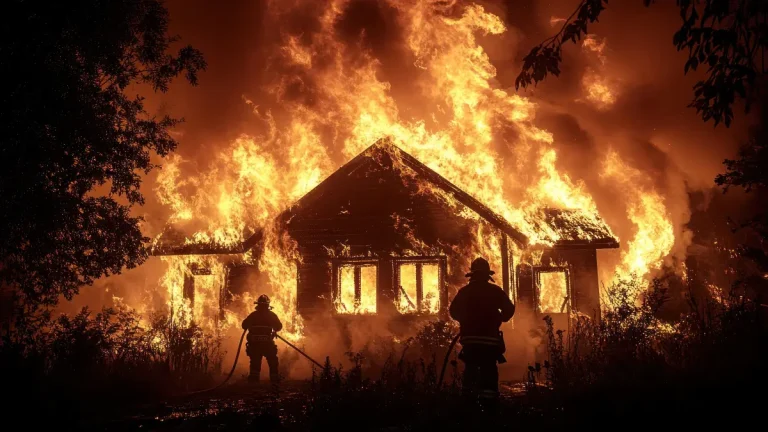A recent fire disaster in the Sivilcon informal settlement, located in Pretoria, has left over 150 residents homeless and destroyed more than 70 shacks. No lives were lost, but the damage is significant. This incident underscores the ongoing fire risks that residents of Gauteng’s informal settlements face daily, especially as the province contends with extreme weather conditions and fire warnings from the South African Weather Service (SAWS).
Thank you for reading this post, don't forget to subscribe!ALSO READ: Today’s Weather Forecast – 13 October 2025
The Sivilcon Fire: A Close Call for the Community
On the afternoon of Saturday, 11 October 2025, a fire broke out in the Sivilcon informal settlement and quickly spread through the densely packed shacks made of wood and corrugated iron. Emergency services from Silverton, Innesdale, and Wonderboom fire stations responded swiftly, evacuating all residents before the fire could escalate further. “The firefighting teams worked tirelessly to suppress the blaze, and thankfully no one was injured or killed,” said Deputy Chief Nana Radebe-Kgiba from the City of Tshwane’s emergency services.
However, the fire caused extensive damage. Carel van Bosch, chairperson of the Sinoville Firefighting Association (SFFA), described the scene as chaotic, with residents desperately trying to fight the fire themselves. “The community was desperate, and some even grabbed equipment from our hands as the fire grew,” Bosch recalled. “As the water supply ran out, panic intensified. The flames spread quickly, destroying entire rows of shacks.”
While firefighters managed to contain the blaze, significant damage occurred. One row of shacks near Zambezi Drive was saved, but the back row was destroyed. The fire left families without shelter, possessions, and the necessities of life.
Weather-Related Fire Risks: SAWS Issues Warning
This disaster coincided with an extreme fire danger warning from the South African Weather Service (SAWS), which placed Gauteng and other provinces at high risk for rapid fire spread. SAWS reported that high temperatures, combined with dry conditions, create the perfect environment for wildfires and the swift spread of fires, particularly in informal settlements.
Informal settlements like Sivilcon are especially vulnerable due to overcrowding and the use of highly flammable materials in construction, which amplifies the fire risk under such weather conditions. “The combination of heat, dry conditions, and overcrowded living spaces makes informal settlements a ticking time bomb,” said fire safety expert Jimmy Roodt. “The danger isn’t just immediate, it’s ongoing, especially when these conditions persist.”
Why This Crisis Persists: Lack of Infrastructure and Fire Preparedness
The Sivilcon fire highlights a recurring issue across Gauteng’s informal settlements. These areas often lack the infrastructure and safety measures needed to manage fires effectively. Roodt and other experts pointed out that many settlements are built with easily combustible materials and lack fire-resistant construction, reliable water supply systems, and adequate fire response infrastructure. “The absence of basic safety standards means fires spread rapidly, leaving residents exposed,” said Roodt. “Without proper planning, these tragedies will continue.”
Emergency services do what they can, but the reality remains that fire safety in informal settlements is inadequate. The infrastructure needed to prevent such fires from turning into disasters simply isn’t in place. “This situation isn’t just about firefighting,” said van Bosch. “It’s about building communities that can withstand fires from the ground up.”
Addressing the Root Causes: Proactive Fire Prevention
The Sivilcon fire and ongoing extreme fire conditions make it clear that Gauteng must prioritize long-term fire prevention strategies for informal settlements. While firefighting response is crucial, experts agree that prevention and preparedness need immediate attention. “We need a multi-layered approach to fire safety,” said Radebe-Kgiba. “That means better infrastructure, more community training, and a national policy on fire safety for informal settlements.”
The solution includes:
- Investing in Fire-Resistant Infrastructure: Local authorities and the private sector must collaborate to provide fire-resistant building materials and improve water supply systems.
- Improving Fire Safety Education: Communities need regular fire safety training, including evacuation drills and awareness programs. “Education is key,” said Roodt. “The more people understand how to react in case of a fire, the more lives we save.”
- Developing National Fire Safety Standards: A national framework addressing fire safety in informal settlements is essential. “A specialized fire safety standard tailored to the needs of informal settlements would be a major step forward,” said Roodt.
The Role of Communities and Local Government
Community involvement plays a crucial role in tackling this issue. Residents should actively participate in local fire safety programs and push for better fire safety infrastructure. At the same time, local governments must ensure that settlements have the necessary resources to deal with fires.
“Communities must unite and push for better safety measures,” said van Bosch. “The government can’t do it alone; we must work together to create safer environments.”
Supporting Fire Safety Efforts
As residents of Gauteng, there are several ways to prevent future fires and support those affected by the Sivilcon disaster:
- Donate to Fire Relief Efforts: Many organizations are accepting donations to help victims of the Sivilcon fire. Seek out reputable charities working directly with affected families.
- Get Involved in Fire Safety Initiatives: Volunteer for local fire safety programs or organize community workshops to teach neighbors how to prevent and respond to fires.
- Advocate for Improved Infrastructure: Push for better infrastructure in informal settlements, including fire-resistant building materials and reliable water sources. Collaborate with local governments to ensure these issues are prioritized.
- Support Fire Safety Legislation: Advocate for national and provincial policies focused on improving fire safety standards in informal settlements. This could include developing a national fire safety standard and resident training programs.
While fires in informal settlements continue to be a persistent problem in Gauteng, there is hope that with the right strategies, communities can reduce the risks and create safer environments for all.




